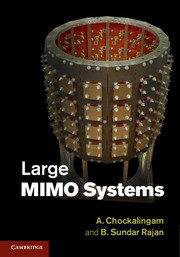Book contents
- Frontmatter
- Dedication
- Contents
- Preface
- Acknowledgments
- Abbreviations
- Notation
- 1 Introduction
- 2 Large MIMO systems
- 3 MIMO encoding
- 4 MIMO detection
- 5 Detection based on local search
- 6 Detection based on probabilistic data association (PDA)
- 7 Detection/decoding based on message passing on graphical models
- 8 Detection based on MCMC techniques
- 9 Channel estimation in large MIMO systems
- 10 Precoding in large MIMO systems
- 11 MIMO channel models
- 12 Large MIMO testbeds
- Author index
- Subject index
- References
9 - Channel estimation in large MIMO systems
Published online by Cambridge University Press: 18 December 2013
- Frontmatter
- Dedication
- Contents
- Preface
- Acknowledgments
- Abbreviations
- Notation
- 1 Introduction
- 2 Large MIMO systems
- 3 MIMO encoding
- 4 MIMO detection
- 5 Detection based on local search
- 6 Detection based on probabilistic data association (PDA)
- 7 Detection/decoding based on message passing on graphical models
- 8 Detection based on MCMC techniques
- 9 Channel estimation in large MIMO systems
- 10 Precoding in large MIMO systems
- 11 MIMO channel models
- 12 Large MIMO testbeds
- Author index
- Subject index
- References
Summary
In the previous chapters, large MIMO detection algorithms were presented under the assumption of perfect knowledge of channel gains at the receiver. However, in practice, these gains are estimated at the receiver, either blindly/semi-blindly or through pilot transmissions (training). In FDD systems, channel gains estimated at the receiver are fed back to the transmitter (e.g., for precoding purposes). In TDD systems, where channel reciprocity holds, the transmitter can estimate the channel and use it for precoding. Due to noise and the finite number of pilot symbols used for channel estimation, the channel estimates are not perfect, i.e., there are estimation errors. This has an influence on the achieved capacity of the MIMO channel and the error performance of detection and precoding algorithms. This chapter addresses the effect of imperfect CSI on MIMO capacity, how much training is needed for MIMO channel estimation and channel estimation algorithms and their performance on the uplink in large-scale multiuser TDD MIMO systems.
MIMO capacity with imperfect CSI
The capacity of MIMO channels can be degraded if the CSI is not perfect. Gaussian input distribution, which is the capacity achieving distribution in the perfect CSI case, is suboptimal when CSI is imperfect [1],[2]. Lower and upper bounds on the mutual information for iid frequency-flat Rayleigh fading point-to-point MIMO channels have been derived for the imperfect CSI case in [3] assuming Gaussian input, where the MMSE channel estimate is assumed at the receiver and the same channel estimate is assumed to be available at the transmitter.
Information
- Type
- Chapter
- Information
- Large MIMO Systems , pp. 197 - 218Publisher: Cambridge University PressPrint publication year: 2014
References
Accessibility standard: Unknown
Why this information is here
This section outlines the accessibility features of this content - including support for screen readers, full keyboard navigation and high-contrast display options. This may not be relevant for you.Accessibility Information
- 2
- Cited by
